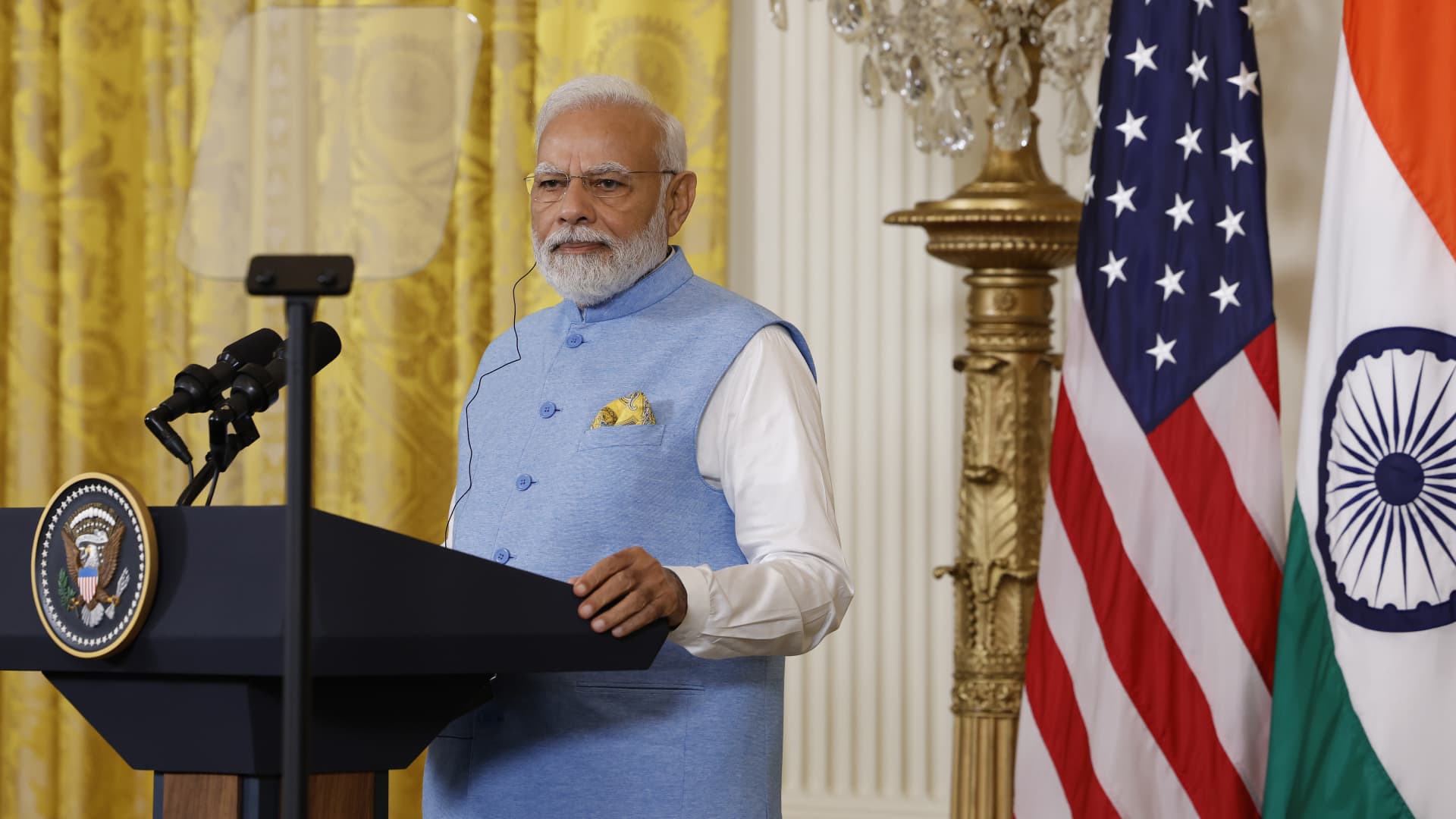
Indian Prime Minister Narendra Modi has looked to woo American semiconductor firms to invest in his country.
Anna Moneymaker | Getty Images
Chief executives of some of the U.S.’s top semiconductor firms poured praise on India’s technology sector at an event on Friday attended by Prime Minister Narendra Modi as the world’s fifth-largest economy looks to position itself as a global chip powerhouse.
The CEOs of Micron and Cadence and senior executives at Applied Materials and AMD were on stage at SemiconIndia alongside Modi, speaking about their investments in India’s chip market. Ajit Manocha, the CEO of U.S.-based industry body SEMI, was also in attendance.
“For the first time in India’s history, geopolitics, domestic policies and private sector capacity are aligned in India’s favor to become a player in semiconductor production,” Manocha said during a keynote speech.
“We will look back in the year 2023 … as a milestone year in which things began to take shape.”
The event with some of the world’s biggest chip firms highlights India’s ambitions to become a major hub for semiconductors alongside the likes of the U.S., Taiwan and South Korea.
India’s chip strategy
India’s chip strategy consists of two major parts. The first is luring in foreign firms to set up operations and invest in the country while the second is on forming alliances with other key semiconductor nations like the U.S.
New Delhi has introduced supportive policies for the semiconductor sector. In December, the government greenlit a $10 billion incentive plan for the semiconductor industry. This is open to foreign firms too.
And last month, Modi visited the U.S. where he said India would work with America on semiconductors and other areas.
At SemiconIndia, the American chip firms in attendance spoke about their investments in India and announced new ones, highlighting India’s focus on attracting foreign companies.
AMD said it plans to invest around $400 million in India over the next five years. This includes a new campus in Bangalore that will be the company’s largest design center.
“India teams will be pivotal in advancing AI machine learning and both hardware and software capabilities,” Mark Papermaster, CTO of AMD, said during a keynote speech on Friday.
Last month, Micron announced plans to set up a semiconductor assembly and testing facility in the state of Gujarat in India. Micron’s investment will total up to $825 million.
“We are hopeful that this investment will help catalyze other investments in the sector, strengthen indigenous manufacturing capability, encourage innovation and support broader job creation,” Sanjay Mehrotra, CEO of Micron, said on Friday.
India’s IT minister Ashwini Vaishnaw said Friday that construction on this plant would start “soon.”
Foxconn’s India setback
One other notable attendee was Young Liu, chairman of Foxconn, which is the Taiwanese company that assembles Apple’s iPhones. Over the past couple years, Foxconn has made a push into semiconductors.
It’s biggest effort came last year when Foxconn agreed with Indian metals-to-oil conglomerate Vedanta to set up a semiconductor and display production plant in India as part of a $19.5 billion joint venture. However, Foxconn pulled out of the venture this month, dealing a blow to both the company and India’s ambitions.
Still, it hasn’t seemed to deter both companies. Liu’s presence at the event signals Foxconn’s ambition to invest in India. Liu told CNBC-TV18 on Friday that Foxconn is looking to invest $2 billion in India over the next five years.
Vedanta Group Chair Anil Agarwal said on Friday at SemiconIndia that the company has “identified world class partners for technology and are in the process of tying up with them” in semiconductors.
India’s challenges
The high-profile event with all the CEOs masks some of India’s challenges in the semiconductor industry.
One area that India could be attractive in is the packaging and testing of semiconductors, according to Pranay Kotasthane, deputy director of the Takshashila Institution. This requires relatively low-skilled labor but high capital investment, which India could have. Yet no major Taiwanese firm in this segment of the market as set up shop in India.
“The lack of policy consistency and high import tariffs are the bottlenecks that can explain why Taiwanese companies haven’t moved ahead,” Kotasthane said.
Meanwhile, in the area of foundries, companies that actually manufacture semiconductors, there haven’t been good technology partners for those trying to set up shop in India. The chip manufacturing tie-up between Vedanta and Foxconn reportedly relied on technology from European semiconductor firm STMicroelectronics.
“None of the fab proposals have yet been able to find good technology partners,” Kotasthane said.
Still, analysts have pointed toward India’s huge domestic market and other factors such as incentives as reasons for optimism on the country’s chip market.
On Friday, Modi touted India’s credentials.
“Skilled engineers and designers are our strength. Anyone who wants to be a part of the world’s most vibrant and unified market has faith in India,” the Indian prime minister said.
